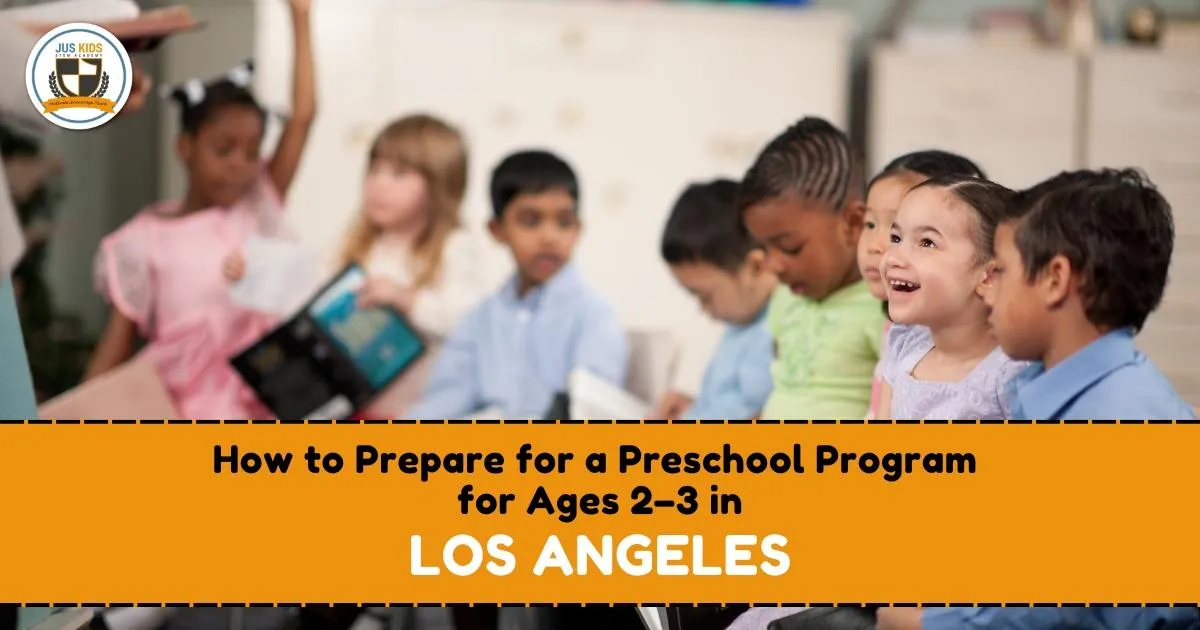
How to Prepare for the Preschool Program for Ages 2–3
Starting preschool can feel like a big step, not just for your little one but for you as well. If you’re wondering how to prepare for preschool, especially for toddlers aged 2 to 3 in Los Angeles, you’re not alone. Many parents face the challenge of balancing excitement with anxiety, trying to get their child ready for this new adventure.
Imagine the scene: your toddler clings tightly to you, eyes wide and uncertain, on their first day at preschool.
It’s a common worry, but it doesn’t have to be that way. With the right approach, preparing for preschool can become a joyful process that helps your child feel confident and eager to learn. This guide walks you through practical advice and activities to prepare for preschool, making the transition as smooth as possible for your toddler and you.
Why Preparing for Preschool Matters
Preschool is often the first structured social and learning environment a child experiences. For toddlers aged 2–3, it’s more than just fun and games; it’s where they start developing independence, social skills, and a love for learning. When you take the time to prepare a toddler for preschool, you’re giving them the tools to handle new routines, people, and activities. Without preparation, the first day at preschool might feel overwhelming, leading to tears and stress for both of you.
In Los Angeles, preschool programs offer a mix of educational and play-based learning. Preparing your child means helping them adjust to this new setting with excitement rather than fear.
How to Prepare Your Child for Preschool: Step-by-Step
Let’s break down the key steps you can take to prepare your child for preschool and ease that transition.
1. Talk About Preschool Early and Often
Before preschool starts, begin talking with your toddler about what to expect. Use simple, positive language. For example, say, “You’ll play with new friends and learn fun things at preschool!” Asking questions like, “What do you want to play with at preschool?” invites curiosity and excitement.
Repetition helps toddlers grasp the idea, so bring up preschool casually in daily conversations. This approach eases anxiety by making the unknown feel familiar.
2. Establish a Consistent Routine
Children thrive on routine. Preparing for preschool includes adjusting daily schedules to match what the preschool day will look like. Start waking your child up, eating meals, and taking naps around the same times they will at preschool.
A consistent routine helps your toddler feel secure and more ready to adapt on the first day at preschool. It also sets the stage for better behavior and cooperation throughout the day.
3. Practice Separation
If your toddler isn’t used to being away from you, preparing for preschool means practicing separation gently. Begin with short periods apart during the day, like playdates or brief visits to a trusted caregiver. Always say goodbye with a clear, calm message like, “Mommy will be back after you play.”
This helps your child get comfortable with the idea of you leaving and returning, which is crucial for handling the initial separation anxiety on their first day at preschool.
4. Introduce Preschool-Style Activities
One of the best ways to get ready is by doing activities to prepare for preschool at home. These activities help your child develop skills they’ll use daily at school. Try simple tasks like
Coloring or finger painting to boost creativity
Singing nursery rhymes to build language skills
Practicing taking turns with toys to encourage sharing
Playing with blocks to improve fine motor skills
These fun activities also give your child a taste of what to expect in a preschool environment.
5. Visit the Preschool Together
If possible, take a trip to the preschool before the first day. Walk around the classroom, meet teachers, and explore the playground. This firsthand experience can calm your child’s nerves and build familiarity.
When you talk about the visit later, it feels less scary because they already know what to expect. This simple step is a great way of preparing for preschool, especially for sensitive toddlers.
How to Prepare a Toddler for Preschool Socially and Emotionally
Preschool isn’t just about learning letters and numbers; it’s a huge social milestone. Helping your toddler feel comfortable around new children and adults is essential.
Encourage Social Play
Invite friends or neighbors over for playdates. These low-pressure social interactions help toddlers learn to share, take turns, and communicate. When children feel confident playing with others, their first day at preschool becomes less intimidating.
Talk About Feelings
Use books or stories that discuss emotions. Help your child identify feelings like happiness, sadness, or frustration. You might say, “It’s okay to feel nervous. Everyone feels that way when trying something new.”
By normalizing emotions, you empower your child to express themselves and seek comfort when needed at preschool.
Teach Simple Self-Help Skills
Encourage your toddler to do basic things on their own, such as washing hands, putting on shoes, or using the potty. These tasks might seem small, but mastering them builds independence and confidence.
Knowing they can manage these skills at preschool will help your child feel more secure and ready to learn.
How to Prepare for Preschool: What Parents Should Know
As much as preparing your child is important, getting yourself ready matters too. Preschool opens a new chapter that affects the whole family.
Communicate With Teachers
Establishing a relationship with your child’s teachers helps create a supportive environment. Share any concerns or special needs your toddler has. This partnership can make all the difference on the first day at preschool and beyond.
Pack the Essentials
Make a checklist of items your toddler needs for preschool, snacks, extra clothes, and a favorite blanket or toy for comfort. Label everything to avoid mix-ups. Being organized will reduce last-minute stress and show your child you’re prepared for this new journey.
Expect a Transition Period
Remember, it’s normal for toddlers to take time adjusting to preschool routines. They might be tired, clingy, or even reluctant at first. Patience and encouragement go a long way.
You’ll soon see your child blossom, making friends and learning new things every day.
Fun Activities to Prepare for Preschool at Home
Wondering about activities to prepare for preschool that keep your toddler engaged and learning? Here are some easy ideas:
Storytime: Reading aloud builds language skills and attention span. Pick colorful books with simple stories.
Role Play: Pretend to be a teacher or student. Use stuffed animals as classmates to mimic preschool routines like circle time or snack time.
Name Practice: Help your child recognize and write their name with fun art projects.
Outdoor Play: Encourage running, jumping, and climbing to develop gross motor skills important for playtime.
These activities don’t just pass time; they actively prepare your child for preschool life.
First Day at Preschool: What to Expect and How to Support Your Child
The first day at preschool can be emotional for both of you. Here’s how to help:
Dress your child in comfortable, easy-to-manage clothes.
Arrive early to explore the environment and meet teachers.
Stay calm and positive; your attitude sets the tone.
Say a clear goodbye and keep it short; prolonged goodbyes can increase anxiety.
Trust the teachers to take good care of your child and check in later for updates.
Remember, the first day is just the start of an exciting journey.
Wrapping It Up: Preparing for Preschool With Confidence
Preparing for preschool is a mix of practical steps and emotional support. By introducing your toddler gradually to new routines, social skills, and preschool-style activities, you’ll set the stage for a positive experience. And don’t forget to take care of yourself along the way, you’re part of this transition, too.
Your child’s preschool journey in Los Angeles is just beginning. With patience, love, and a little preparation, the first day at preschool will soon become a treasured memory of growth and discovery.
Ready to give your toddler the best start? Visit Jus Kids Academy and explore Just Kids Academy’s preschool programs today!
FAQs
1. How do I help my toddler deal with separation anxiety on the first day?
Use short goodbyes and a consistent drop-off routine. A favorite toy can also provide comfort.
2. What should I do if my child refuses to eat at preschool?
Pack familiar snacks and talk with teachers about preferences. Praise any food your child tries.
3. How can I support my child’s language development before preschool?
Talk, read, and sing with your toddler daily. Encourage them to use words to express feelings.
4. When should I start preparing my toddler for preschool?
Begin a few months before preschool by introducing routines and socializing. This helps ease adjustment.
